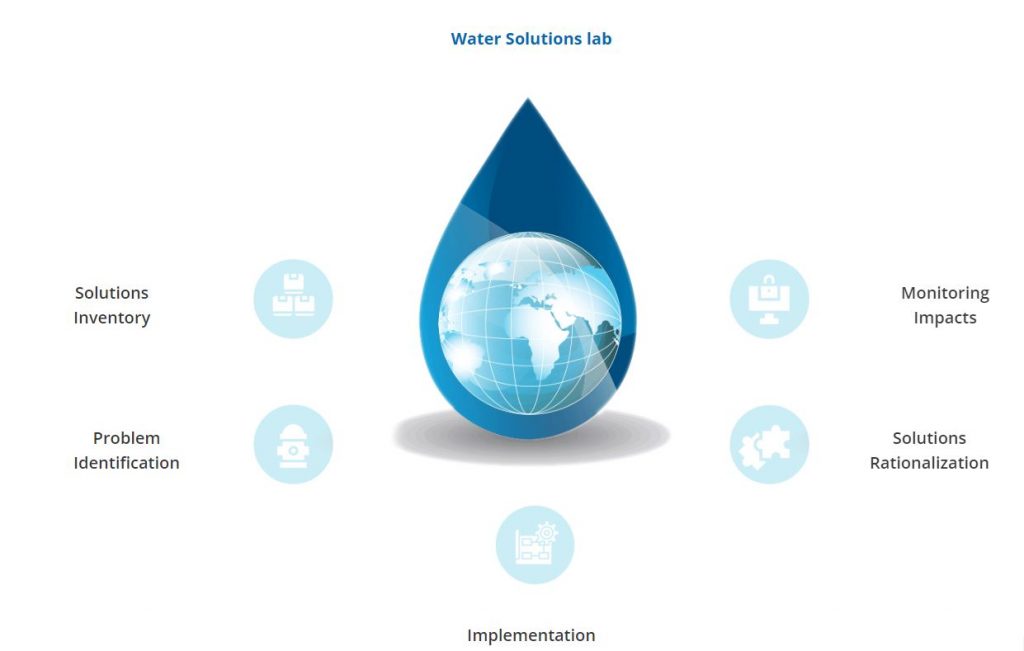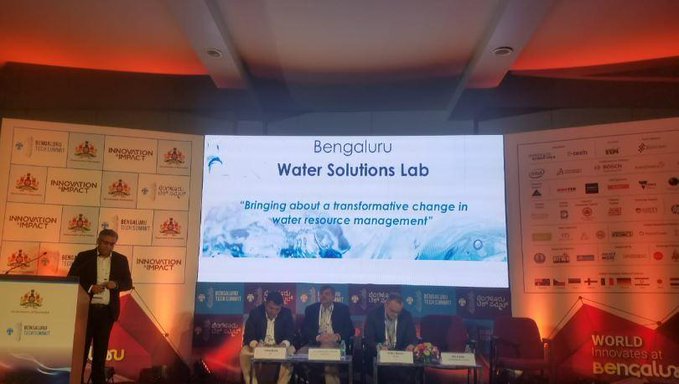Bengaluru Water Solutions Lab
“Ensure availability and sustainable management of water and sanitation for all” is the 6th out of the 17 Sustainable Development Goals (SDGs) adopted by the UN General Assembly as a part of Agenda 2030. SGD6 also forms the basis of achieving other SDGs such as “Zero Hunger”, “Good Health and Well-Being”, “Gender Equality”, “Sustainable Cities and Communities”, and “Climate Action”. Global assessments show that we are lagging behind considerably given that we are facing major challenges such as 80% of World’s wastewater is discharged untreated, 3.6 billion people live in water-scarce areas which are projected to increase to 5 billion by 2050, and 52% of the global population lives in urban areas which are going to increase to 65% by 2050. The challenges are many and solutions must be implemented rapidly. A major hurdle in the implementation of solutions to water problems is the disconnect between knowledge generators and knowledge implementors. The Water Solutions Lab (WSL) initiative of the Sustainable Water Future Programme (Water Future) of Future Earth aims to bridge the disconnect by establishing “a framework to facilitate the process of innovation in water-related issues. WSL integrates problems with solutions towards identifying a feasible set of solutions that address the root causes of the problem at the local level.”

Water Solutions Lab, Bengaluru (WSLB) is the first of its kind, established in late 2017 under the collaboration of Future Earth South Asia Regional Office and Water Future, hosted and primarily funded by Divecha Centre for Climate Change, Indian Institute of Science. Since its establishment, the WSLB is facilitating the process of innovation in water-related issues in the City of Bengaluru, by strongly connecting problems with solutions, and knowledge generators with knowledge implementers. It offers comprehensive water system diagnostics and brings forward custom-made innovative solutions through a combination of advanced scientific knowledge, multi-stakeholder involvement, multi-criteria analysis and digital information technology to address emerging water challenges in the city of Bengaluru. WSLB specifically focuses on urban water challenges and helps bridge the gap between science, policy, and governance, and between knowledge and practice, to address SDG6. The work of the WSLB is future-oriented and characterized by independence, integrated study, and interdisciplinarity.
The structure of the WSLB constitutes 1) A governing board chaired by Mr. Ravi Narayanan, who is also chair of Governing Council of Asia Pacific Water Forum and includes ex officio members from Future Earth (Prof. S.K Satheesh), Sustainable Water Future Programme (Prof. Anik Bhaduri) and Divecha Centre for Climate Change (Prof. J. Srinivasan); 2) A Science and Engagement committee chaired by Prof. Mohan Kumar and Prof. R. Srinivasan, and includes Dr. Sharachchandra Lele and Dr. S.A Pandit and 3) The Management group that includes the Director (Prof. Anik Bhaduri) and Associate Directors (Dr. Chandan Banerjee and Mr. Aditya K. Kaushik).

The defining feature of the WSLB is the interaction between users and developers in a collaborative workspace environment, which exists to establish co-designed standard assessment products and specialized on-demand products as required. In this way, the products of the WSLB will be tailored to meet the needs of users, as opposed to embedding existing assessments into frameworks for which they were not designed. WSLB will produce a series of next-generation comprehensive water assessment products combining social, economic, hydrological, and biogeophysical information for policymakers and business communities to help in their decision making under uncertain conditions. The products are co-designed and co-produced through an evolving science-policy-business dialogue, authoritative in nature and based on transparent and peer-reviewed scientific research.

Towards this endeavor, WSLB projects include:
- Comprehensive assessment of geogenic contaminants that affect water quality in India and assessment of the health impact of these contaminants on human life and biodiversity
- Real-time water quality monitoring and development of a wastewater market using Blockchain Technology integrated with Internet of Things, Machine learning and Big Data
- Development of a customized dynamic water security index at ward level for the city of Bengaluru in near real-time data to produce retrospective and present assessment of the state of the water resource base of Bengaluru at a high spatial resolution
- Lake rejuvenation and governance for the city of Bengaluru
- Capacity Development Programs for next-generation water practitioners with a focus on key planning challenges, adopting and capitalizing on the best state-of-the-art science, technology, and water assessment tools and promoting the expanded use of integrated approaches to the design of future water security systems for the city of Bengaluru
WSLB also undertakes science communication and outreach programmes. A key initiative in this direction was organizing an international conference titled ‘Towards a Sustainable Water Future’ in Bengaluru, India from 24th to 27th September 2019. The conference addressed the current state of global water resource challenges, future pathways, and scenarios, and different technological, institutional solutions to accelerate the implementation of water-related SDGs and the 2030 Agenda targets with an aim of ‘leaving no one behind’. Around 700 participants all across the globe attended the conference thus giving a major opportunity for academics, water practitioners, policymakers, scientists, civil society and government officials to discuss the direction that the global science community should take in order to solve myriad of challenges affecting our water systems in real-time and develop new frontiers for innovative solutions. The outcome of the conference titled Bengaluru – Budapest Science Action Plan was input to a high-level political event called the Budapest Water Summit organized by the Government of Hungary from 15-17 October.
The Bengaluru – Budapest Science Action Plan calls for the development of an evidence-informed and value-based digital operating framework for water across scales that will integrate various aspects such as hydrology, biogeochemistry, ecology, human health, culture, social-economic behavior, and institutions along with understanding feedbacks at different scales in near real-time for all stakeholders. This will enable us to identify, predict, and adjust responsible production and consumption behaviors under varying risk conditions based on evidence-based science.
Another significant development was the signing of MOU between the WSLB and the Bengaluru Water Supply and Sewerage Board (BWSSB)with the aim to establish a collaborative partnership, founded on the principles of collaboration and cooperation, to provide expertise and resources for undertaking coordinated and strategic research activities that will underpin the sustainable management and use of water in this time of significant global environmental change. The broad aim is to enhance the contribution of strategic scientific and technical research and innovation to sustainable management for the city of Bengaluru.